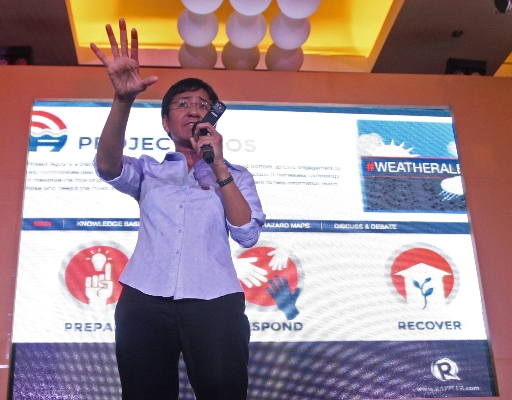
Rappler CEO Maria Ressa talks about how Rappler came to be at Geeks on a beach. (CDN PHOTO/TONEE DESPOJO)
Technology has been a game changer in journalism and most media organizations are having a hard time adapting to it, said Maria Ressa, CEO of Web-based news agency Rappler.
Speaking at yesterday’s Geeks on a Beach 2 (GOAB) at the Movenpick Hotel in Mactan island, Cebu, she said the Internet age has changed all business models including the way the news is delivered.
Breaking news has to be fast and mobile technology has aided news agencies in making this happen, she said.
Ressa, who was regional bureau chief of Cable News Network (CNN) and head of ABS-CBN News before setting up Rappler, said news organizations have to shift models, but it has not been easy.
“They’re not ready,” she said.
In Rappler’s case, she said the saw “phenomenal growth” in the past two years in forming business partnerships young skilled IT developers.
“Our institutions need help and they need you,” Ressa said.
Ressa recalled how Rappler started with 12 people in a small room more than two years ago, much like most start-ups that are trying to break through the tech business.
Rappler, she said, used whatever technology they had at hand in providing online and mobile news with TV broadcast news processes built into information technology.
A mixture of professional journalism, technology and the “wisdom of the crowds”, the social news website is among the top ranking news websites in the country.
When Rappler started, reporters used smartphones connected to higher-quality cameras and professional audio equipment to record news stories.
Since the method is faster than traditional media, Ressa said this innovation paved much of the way for Rappler to be first in breaking stories.
Technology has allowed journalists to help, like using hashtags in rescue and relief operations when typhoon Yolanda hit the Philippines last year.
Ressa said the platform, using information sourced from citizens all over social media, was very helpful in disaster response operations following typhoon Glenda last July.
Ressa encouraged traditional news organizations to change work flow, adopt technology and try to do something new.
“Traditional news groups need to change dramatically but they are not ready,” she said.
However, she said startups can help mainstream news agencies.
Today a news organization must be able to string stories together and come up with more relevant stories out of the noise of tweets and other social media posts.
“The crowd is an incredible game changer and our institutions need help. They need you (startups),” Ressa said.
While she said the creativity of startup communities will provide an interesting edge in journalism, it is still the discipline of journalism that will keep traditional media afloat.
Related Stories:
Five factors to launch PH’s startup revolution
Cebu to host Geeks on a Beach 2 in August